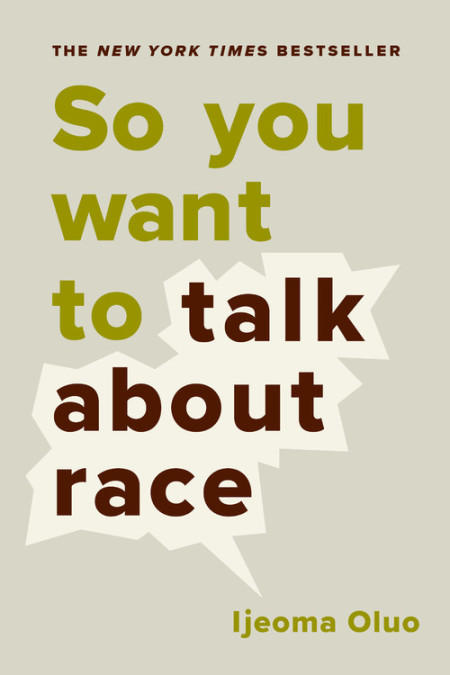So you want to talk about race
By Ijeoma Oluo
Seal Press, New York, 2018
In the wake of the murder of George Floyd by a white police officer in Minneapolis, and the nation-wide protests that followed, many white people, including me, have finally started to wake up to the depth and breadth of racism and injustice in our police forces and in society as a whole.
For those of us who want to learn more, there are plenty of articles, videos and books to choose from. One of the most frequently recommended books is So you want to talk about race by Ijeoma Oluo.
Oluo calls herself a “writer, speaker and Internet Yeller”. She was born in Texas but grew up and lives in Seattle. Her work has been featured in The Guardian, The Washington Post and The Stranger. Oluo’s father is from Nigeria, and her mother is a white woman from Kansas.

An FAQ for white people
So you want to talk about race, is aimed squarely at white people who want to know more about racial injustice and how to talk about it with Black friends and colleagues.
Think of it as an FAQ for white folks. Oluo addresses questions like:
- What is racism?
- Why am I always being told to “check my privilege”?
- Is police brutality really about race?
- What is intersectionality and why do I need it?
- I just got called a racist, what do I do now?
Each of the book’s seventeen chapters is devoted to answering one of these questions. I think the chapter on “What is racism?” is really important because it sets the framework for the rest of the book.
Oluo uses this definition:
“Racism is any prejudice against someone because of their race, when those views are reinforced by systems of power.” [p. 26]
She says it’s not enough to talk about prejudice by itself, because if we do that, then combating racism gets reduced to a battle over sentiment – trying to convince individual racists to change their minds, to be nicer people. It’s critical that we understand racist behavior and racial oppression as part of a larger system. If we just focus on prejudice, then we won’t do the hard work of rooting out the systemic racism that’s built into our structures of economic and political power.
Throughout the book Oluo shines a penetrating light onto the systems of power and oppression that many of us white people either don’t experience or don’t even know exist. This includes police brutality, the school-to-prison pipeline, microaggression and cultural appropriation.
Oluo starts each chapter with incidents from her own life followed by a thorough exploration of the question backed by relevant research and statistics. Most of the chapters finish with suggestions or guidelines for how to discuss the question with people of color.

Oluo writes with passion. She reveals some of the pain, suffering, humiliation and anger she’s experienced as a Black woman throughout her life, and that countless Black men and women have experienced for centuries.
Understand then act
One of the greatest privileges that white people enjoy in the US is that we don’t have to think about being white. We don’t have to think about race at all most of the time. A lot of us are not even aware that our whiteness means anything. It’s our privilege to read about racism in books rather than experience it in schools, on the streets, at our places of work, or in the courts. So you want to talk about race makes it painfully clear that racism is an ever-present, ever-oppressive fact of daily life for Blacks and other people of color.
The scope and complexity of the problem make it seem impossible to address. Where do we start? How can we make even a tiny dent in a problem that has tortured this country for hundreds of years?
I think Oluo would say that we start by talking with each other, trying to understand each other better. Her book is a valuable guide to having those conversations.
But ultimately change only comes from action. Oluo urges us to take concrete actions to end systemic racism. The final chapter suggests ways we can all help do that.
Last year I read Ibram Kendi’s excellent 2019 book How To Be An Antiracist which I reviewed here. In the current moment, with protesters getting tear-gassed by armor-clad police, I realized I needed to learn more to understand the situation better and hopefully to act in some meaningful way. So you want to talk about race helped. It’s less academic and less philosophical than Kendi’s book, more a practical guide, and perhaps a little easier to read. But they also have a lot in common especially the focus on understanding and dismantling systemic racism.
When you want to have a conversation about race, or even if you never do, you’ll be better informed and better able to act after reading this book.
Related Links
Uncomfortable Conversations with a Black Man
A series of videos featuring former NFL linebacker Emmanuel Acho exploring similar questions about race and social justice.

Pingback: White Fragility | Unsolicited Feedback
Pingback: Down Girl: The Logic of Misogyny | Unsolicited Feedback
Pingback: The Socrates Express | Unsolicited Feedback
Pingback: Nonfiction November: My Year in Nonfiction | Unsolicited Feedback